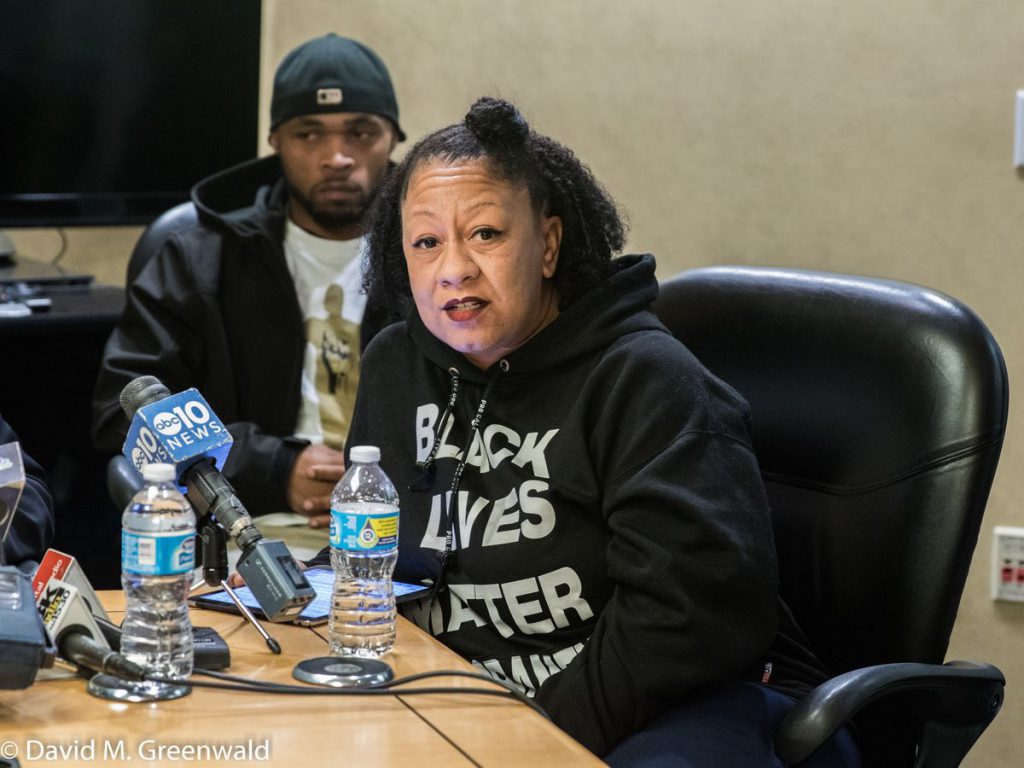
By Crescenzo Vellucci
Vanguard Capitol Bureau
SACRAMENTO – Now, President Donald Trump and Sacramento Sheriff Scott Jones have more in common – both have been sued for blocking critics from their social media pages, an alleged violation of the constitutional rights of those critics.
Earlier this week, Sacramento Black Lives Matter organizers Tanya Faison and Sonia Lewis sued Jones in federal court for civil rights violations – namely, blocking them from his social media pages because Jones apparently didn’t like what they said.
Trump was sued last year when he blocked users from his infamous Twitter page. A New York federal court ruled those were First Amendment violations, and in January the 4th Circuit Court of Appeals found that the “interactive component” of an elected official’s page is, in effect, a public forum and people can’t be blocked because of their political point of view.
According to the Faison, the “censoring started after the Sacramento County Inspector General published a report criticizing sheriff’s deputies who killed Mikel McIntyre. While unarmed, he was shot to death on the shoulder of Highway 50. One of Jones’ deputies fired 18 shots across the road as McIntyre was running away,” she said.
“Sheriff Jones responded by refusing to allow any further investigation and he locked the Inspector General out of buildings. The lockout was reported in the media and was discussed by the Board of Supervisors. When I commented on that post, he deleted my comments. Then he banned me from his page. I am still blocked. This is oppressive,” she said.

Jones also charged that Black Lives Matter wanted to abolish the police, and another post where Faison stated that “all cops are bastards.”
As upsetting as that may be to Jones, the courts have ruled that the public pages of elected are public forums, according to the lawsuit
“The internet is an important place for the Black Lives Matter movement. We use it to share our messages, spread important news, and amplify calls for racial justice. Facebook is one of the only places we can engage with the sheriff and his supporters. Expressing our views is a part of our role as residents of Sacramento,” said Faison.
“We feel compelled to call public attention to state violence and racist policing. Whether or not the sheriff likes our message, we must have the ability to hold his office accountable. He relies on Facebook to communicate with the public; he doesn’t get to pick which constituents he wants to engage and block the rest. He’s using unfair tactics to try to silence us and shut down our movement,” she said.
There’s been bad blood between Black Lives Matter and the sheriff (and other local law enforcement) for years, especially the last year since unarmed Stephon Clark was shot and killed by Sacramento City Police. Sheriff choppers played a part in the killing.
And at a protest later, sheriff’s department deputies ran over a protestor on Florin Road, and Jones – who seldom if ever releases video footage – made a point to single out “paid” protestors and attempt to show his deputies did nothing wrong. However, the footage went national and international, embarrassing the department.
“Sheriff Jones has been relentless in his pursuit to silence me and other members of the Black Lives Matter Sacramento chapter. He’s said publicly that I am an unfit leader for the Black community. He’s called for counter protesters to show up at our rallies. And now he’s censoring us on social media,” said Faison
Among the causes of action in the federal lawsuit is Jones’ banning of Faison and Lewis, which is, according to the suit, “not content-neutral, nor narrowly tailored to serve important government interests, nor did it leave open ample alternative channels for communication of their messages. For these and other reasons, his conduct infringed upon Plaintiffs’ rights under the First Amendment and the California Constitutions.”
It asks the court to order Jones to “unban” the two activists.
The suit also notes there is “viewpoint discrimination,” and in the second cause of action says Jones deleted their comments “because of the viewpoints they expressed on that Page and the viewpoints they have expressed as members of BLM-Sacramento. Sheriff Jones’ censorship and banning of Plaintiffs based on their viewpoints violated their right to freedom of expression under the United States and California Constitutions.”
The third cause of action is “speaker-based discrimination), in that Jones banned the activists and deleted their comments because “of their identities and affiliation with BLM-Sacramento, a group which publicly criticizes Sheriff Jones.”
Finally, the suit lists a fourth cause of action as “an actual, present and justiciable controversy between Plaintiffs and defendant concerning Plaintiffs’ right to participate in public debate by posting, responding and commenting on the Sheriff Jones Facebook Page.”
The lawsuit requests that the court agree that Jones violated the First Amendment rights of the activists by banning them from Jones’s page, and deleting their posts, and that the court grant injunctive relief enjoining Jones from engaging in unlawful censorship against the Plaintiffs and others similarly situated by banning them on the Sheriff Jones, granting injunctive relief mandating that Defendant “unban” Plaintiffs from the Sheriff Jones Facebook Page and “restore their deleted posts, and enjoining him henceforth from banning them or deleting their posts.”
Interestingly, the filing only asks only nominal damages of one dollar each, but also awarding the activists punitive damages and reasonable attorney fees and costs.






Surprised no comments here – downside of the new Vanguard policy. This is an interesting emerging area of law – can a government official deny access to a private page he is using for communication. The courts are leaning toward a no here.
http://www.hawaiifreepress.com/ArticlesMain/tabid/56/ID/12959/HPD-Ordered-to-Pay-31K-over-Censored-Facebook-Comments.aspx
More than a lean. Damages awarded.